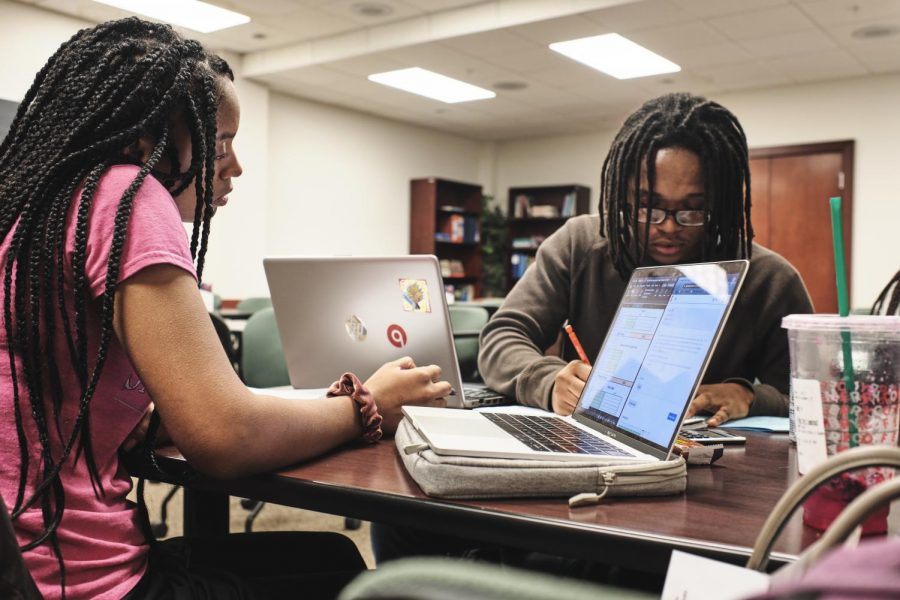Campus experts speak on coping, study strategies for swamped students
Shelbi Stone, junior in Business, tutors Terik Coleman, sophomore in DGS, at the Office of Minority Student Affairs academic services center on Dec. 5. Students exercise different studying strategies for finals, like getting a tutor.
December 12, 2019
When finals week rolls around, two student struggles clash; how does one cram in a semester’s worth of information without sacrificing their health and wellness?
The Daily Illini spoke with campus experts in tutoring and stress management, as well as two STEM students with heavy exam schedules, to hear their strategies for coming out of finals week relatively unscathed.
Grace Casillas is assistant director of the Office of Minority Student Affairs, having supervised its tutoring program for 18 years.
Casillas stands by standard recommendations: Go to exam review sessions, pore over old class exams if they’re available, do the practice problems.
For students who’ve waited till the last minute, Casillas said even a little spacing in your study sessions can go a long way.
Get The Daily Illini in your inbox!
“If you have a week before an exam — say your exam is on Friday — study on Monday and study again on Thursday, when you pick it up again, you may have trouble remembering what you learned, but it’s helping you realize your brain is working a little harder,” Casillas said.
This practice, known as distributed learning, is effective at identifying gaps in a student’s knowledge.
There are other clever ways to jog your memory. Casillas swears by the cognition effects of peppermint. According to Casillas, chewing peppermint gum during study time and exam time can enhance recall and calm fidgety test-takers.
Casillas preached catering toward your learning style. If you’re an auditory learner, talk through the content. If you enjoy discussion, find a partner, even if you’ve fallen behind in the class.
“You’re going to feel like, ‘Oh, they know more than I do.’ But you might surprise yourself,” Casillas said. “You might have insights that they don’t have.”
Student strategies
Molly Vance and Nathan Roden, both sophomores in LAS, are each tasked with four or more final exams and projects. Their study approaches vary widely.
Vance has an exam each day for the first four days of finals week. Drawing on past experience, she’s been hitting the books since the Sunday after fall break.
“In past semesters I’ve waited till the last minute or Reading Day to even start, and it’s not a good idea,” Vance said. “Once that material hits all at once, it’s just not great.”
Today, she finds an empty classroom to work through problems on the whiteboards. Vance brings along her twin sister Hannah to review the content and elicit discussion.
“I study really well alone, but that only gets you so far,” Vance said. “As long as I’m with someone else and I can go to a classroom and write it on the board, it makes the information sink in more.”
Roden is saving his study grind for Reading Day. After finishing two final papers, Roden adopts a rigorous study regiment that could make even the most expert crammers flinch.
“I wake up, have breakfast and cram for like four hours until lunch,” Roden said. “I cram for another five or six hours, then dinner, and then I cram till I go to bed at around midnight.”
Roden insists on working through each final one at a time. This year, that presents a challenge, since his physics and chemistry finals are less than 24 hours apart.
Against expert advice, Roden is gearing up for an all-nighter on Wednesday.
“You’re more apt to do well if your brain has gotten some rest and is able to think clearly,” Casillas said. “I’ve heard so many horror stories of people that have stayed up all night and slept past the exam or gotten there and couldn’t think clearly.”
Roden isn’t worried about the decision. He sees it as one last push before he’s home free.
“It’s break after that..” Roden said. “Once I’m done with chemistry, I’m going to go and take a fat nap on the bus.”
Stress management
Jennifer Carson is the primary coordinator for McKinley Health Center’s stress management program.
Carson said finals stress can manifest in a stacking fashion. When it’s harder to concentrate, students can become more lethargic, facing appetite changes, muscle tension, headaches and overall irritability.
This time of year, a lot of key habits go by the wayside.
“We compromise our own self-care,” Carson said. “That may mean we’re not getting to bed when we need to get to bed, or we’re skipping a meal or skipping that workout — all those things that help us maintain that daily stress.”
Carson recommends mixing up the content in long study sessions and never bringing more than you need.
“If you know you’ve got a specific task you need to be doing, and this is what I have to work with cause this is all I brought, we tend to stay on task more,” Carson said.
As for cramming, too much can take a toll on a student’s well-being, but she’s seen students have good outcomes with it.
“If something is working for you and you still feel like it’s healthful — not helpful, healthful — you probably don’t need to change it,” Carson said.
On Reading Day, McKinley is tabling at the ARC and UGL with stress balls and giveaways. Carson recommends McKinley’s Wellness App for its listing of study locations and memory mix-up games.
OMSA is hosting final exam review sessions through Tuesday at their Academic Services Office. As for their tutoring services, they may help, but nothing beats starting early.
“The sooner you start, you get on the right track, the better off you’ll be,” Casillas said. “It allows the tutor to help you pace yourself, and identify what kind of learner you are and how they’re going to approach working with you.”







